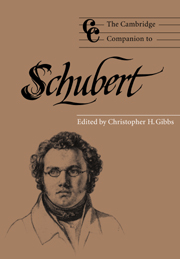Book contents
- Frontmatter
- Introduction: the elusive schubert
- Part I Contexts: musical, political, and cultural
- 1 Realism transformed: Franz Schubert and Vienna
- 2 “Poor Schubert”: images and legends of the composer
- 3 “The Passion for friendship”: music, cultivation, and identity in Schubert's circle
- 4 Schubert's inflections of Classical form
- 5 Schubert and his poets: issues and conundrums
- Part II Schuberts music: style and genre
- Part III Reception
- Notes
- Index
5 - Schubert and his poets: issues and conundrums
from Part I - Contexts: musical, political, and cultural
Published online by Cambridge University Press: 28 September 2011
- Frontmatter
- Introduction: the elusive schubert
- Part I Contexts: musical, political, and cultural
- 1 Realism transformed: Franz Schubert and Vienna
- 2 “Poor Schubert”: images and legends of the composer
- 3 “The Passion for friendship”: music, cultivation, and identity in Schubert's circle
- 4 Schubert's inflections of Classical form
- 5 Schubert and his poets: issues and conundrums
- Part II Schuberts music: style and genre
- Part III Reception
- Notes
- Index
Summary
Lieder begin with words; they are born when a composer encounters poetry. If the statement seems obvious, it is not reflected in writings on music, which tend to “skip over” the literary surroundings in order to arrive more swiftly at musical matters. Considerations of historical context are customarily confined to discussions of the composer and the music rather than the poet and the poetry, even in those instances where the poet and composer knew one another. Although scholars have, on occasion, probed questions of transmission – how a composer found a particular poetic repertory and, more commonly, Schubert's “reading” of those poems he set to music – many issues remain tantalizingly fertile areas for investigation. There are even basic enigmas of identification yet to solve – who was “A. Pollak,” whose name appears on the title page of the late song Fruhlingslied (D919). Who wrote the texts for Aufden Sieg der Deutschen (D81) or the beloved Wiegenlied (D498)? Song composers tend to search a variety of sources for new and old poetry to convert into Lieder; if they do so in special ways and for specialized reasons, they are nonetheless active participants in the literary milieu of their day.
The gravitational forces that draw a composer to a particular poet, poetic circle, or specific anthology are multitudinous and shift into new configurations at each encounter with a body of poetry. Proximity to local writers, access to poetic works from Germany as well as Austria, friends with wide-ranging philosophical and literary interests, literary fads and fashions (the Walter Scott craze, the Ossian enthusiasm, and the like), and various crises in life all play a part in Schubert's adoption of a poem for musical purposes - as long as the poem had music in it, his music. This evocative phrase, difficult to define, is at the heart of the songwriting enterprise and is one of its most intriguing mysteries.
- Type
- Chapter
- Information
- The Cambridge Companion to Schubert , pp. 99 - 118Publisher: Cambridge University PressPrint publication year: 1997

